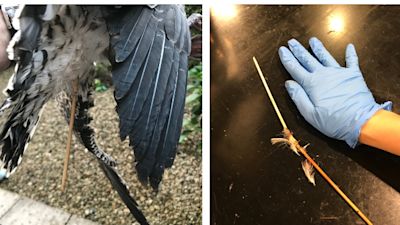Gull dies after being skewered on kebab stick in Bristol

The RSPCA is urging people to dispose of their rubbish responsibly after a young gull died after being found with a wooden kebab skewer through his body in Bristol.
The stricken gull was discovered in Alma Road, Clifton, on 23 July with several inches of the stick embedded in him.
RSPCA Animal Collection Officer Gary Lucas rescued the bird before taking him to Bristol Animal Rescue Centre where the veterinary team battled to save him after removing the stick.
The RSPCA has received more than 21,600 reports of animals injured or caught in litter over the past five years - in Bristol alone there were 117 reports.
RSPCA officers are regularly called to help cats, birds and other wildlife who get themselves tangled in netting, injured in fishing litter, or stuck in rubbish.
Recent incidents include a gull whose legs had became tangled in a disposable face mask and a fox with her head stuck in a plastic bottle.
Head of the RSPCA’s wildlife team Adam Grogan says: “Our staff are dealing with thousands of incidents every year where animals and birds have been impacted by litter - and they’re the ones that we know of. I’m sure for every animal we’re able to help there are many that go unseen, unreported and may even lose their lives.
“Litter is one of the biggest hazards our wildlife faces today - and it’s something that’s very easy to resolve. That’s why we’re calling on the public to take extra care to clear up after they’ve been out for a walk or enjoyed a picnic in the woods. "
The RSPCA is asking people who see litter to pick it up safely and put it in the bin, remembering to wash their hands afterwards. It says doing so could save an animal’s life.
If you’re concerned about the welfare of an animal please contact the RSPCA’s emergency hotline on 0300 1234 999.